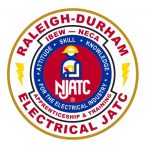So, you’re living in North Carolina and searching for a new career path, huh?
Maybe you’re looking for a career that will provide you with a high income, consistent work, and the chance to grow within this career.
If that’s the case then you’ve certainly found it!
Becoming an electrician in North Carolina is an excellent choice!
Keep reading to find out how you can make it happen.
Go to Page Section:
Electrician Job Duties and Skills In North Carolina
The Bureau of Labor Statistics states that an electrician’s job duties may also include (but are not limited to):
- Reading blueprints or technical diagrams
- Installing and maintaining wiring, control, and lighting systems
- Inspecting electrical components, such as transformers and circuit breakers
Plus more.
Electricians must also possess some soft skills in order to thrive in the electrical industry, like with other jobs.
Some of these soft skills that an electrician should possess include:
- Communication
- Time Management
- Computer Skills
- Customer Service
- Flexibility
- Adaptability
- Math skills
- Teamwork
- Organizational skills
How to Become an Electrician In North Carolina
One – Meet the Education Requirements
If you want to become an electrician in North Carolina, it’s mandatory to gain 576 hours of classroom training.
This is a strict requirement, so make sure to meet it or you won’t be eligible for your electrical license.
To ensure that you gain the necessary hours, you can attend a community college, or go through a technical or vocational school instead.
Two – Meet the Work Requirements
North Carolina also has some required work hours.
You’ll need to gain about 8,000 hours of work experience before you can be eligible to apply for the license.
To gain this work experience, try joining an apprenticeship program and becoming an apprentice.
This could also be a great way to gain more classroom hours, as most apprenticeships will offer at least a few if not all of the classroom hours you’ll need to get your license.
Three – Apply for Your License
After a couple of years, you’ll have gained both the class and work experience required to obtain your license!
The only thing left to do is take the licensing exam.
If you pass, you’ll receive your license!
Training Programs for Electricians In North Carolina
Carolinas Electrical Training Institute
Carolinas Electrical Training Institute offers an apprenticeship program based on the National Joint Apprenticeship and Training Committee’s (NJATC) 4-year curriculum.
This apprenticeship offers students both in-classroom learning and hands-on training.
By the end of the program, students should have completed 8000 hours of work, meaning that they’ll be ready to take the licensing exam straight out of the program.
This program covers the basics, like electrical theory, blueprint reading, wire installation, and more.
It also goes more in-depth and assists students in learning all the ins and outs of the electrical industry.
It’s a great program to be a part of if you want something that will teach you everything you need to know.
Wake Technical Community College
Wake Technical Community College offers The Electrical Systems Technology program.
The Electrical Systems Technology curriculum is designed to provide training for anyone interested in the installation and maintenance of electrical systems found in residential, commercial, and industrial facilities.
The program is well-suited for students who have little to no prior knowledge of the electrical trade and are looking to build a solid foundation of knowledge from the ground up.
EST offers three programs of study: an Associate in Applied Science (AAS) degree, a diploma, and a certificate.
Certificate courses cover the installation and maintenance of electrical systems in residential and commercial applications and also include the National Electrical Code requirements.
Students will also be provided with hands-on training in:
- AC/DC theory
- Residential, commercial, and industrial wiring practices
- Programmable logic controllers
And more.
Raleigh Durham Electrical Jatc
At Raleigh Durham Electrical Jatc, the Raleigh-Durham Joint Apprenticeship Training Committee offers a four-year electrical course.
The course, of course, covers all the basics of electrical work, from reading blueprints to learning the National Electrical Code and electrical theory.
You’ll also learn how to fix faulty wires, install and maintain wiring, and work with programmable controllers.
The program is very similar to most other programs.
However, it’s still a notable program due to its offering of on-the-job training with expert electricians who have been in the industry for decades.
If you’re searching for a program that will provide you with plenty of hands-on experience, this is certainly a great choice.
| School Name | Address |
|---|---|
| Carolinas Electrical Training Institute | 13530 S Ridge Dr, Charlotte, NC 28273 |
| Wake Technical Community Clg | 519 Industrial Dr, Zebulon, NC 27597 |
| Raleigh Durham Electrical Jatc | 3300 US-70, Durham, NC 27703 |
Electrician Salaries In North Carolina
An electrician’s salary can vary depending on a wide variety of factors, such as:
- Work experience
- Skill level
- Knowledge and expertise
- Industry and specialization
- Location
Down below, you can see a table that shows the average salary of an electrician depending on which city in North Carolina they reside in!
Annual Salary Range:| Location | Avg. Annual Salary |
|---|---|
| Charlotte | $63,751 |
| Raleigh | $63,609 |
| Cary | $63,609 |
| Durham | $63,229 |
| High Point | $62,741 |
| Winston-Salem | $62,584 |
| Greensboro | $62,368 |
| Wilmington | $60,111 |
| Asheville | $59,989 |
| Fayetteville | $59,883 |
Regional Salary in North Carolina
| Region | Employed | Avg. Annual Salary | Avg. Hourly Pay | Top 10% Annual Salary | Bottom 10% Annual Salary |
|---|---|---|---|---|---|
| Asheville, NC | 860 | $53,540 | $25.74 | $67,860 | $38,030 |
| Burlington, NC | 290 | $51,780 | $24.89 | $63,430 | $37,650 |
| Charlotte-Concord-Gastonia, NC-SC | 6,420 | $57,300 | $27.55 | $73,670 | $40,680 |
| Durham-Chapel Hill, NC | 1,480 | $61,400 | $29.52 | $78,300 | $45,650 |
| Fayetteville, NC | 800 | $57,340 | $27.57 | $81,360 | $43,170 |
| Goldsboro, NC | 140 | $50,700 | $24.38 | $66,350 | $37,400 |
| Greensboro-High Point, NC | 1,800 | $54,960 | $26.42 | $68,190 | $39,030 |
| Greenville, NC | 470 | $53,880 | $25.90 | $64,690 | $38,750 |
| Hickory-Lenoir-Morganton, NC | 690 | $54,140 | $26.03 | $67,530 | $38,290 |
| Jacksonville, NC | 170 | $53,580 | $25.76 | $68,700 | $35,940 |
| Pinehurst-Southern Pines, NC | 140 | $54,900 | $26.39 | $75,370 | $36,290 |
| Raleigh-Cary, NC | 3,790 | $55,810 | $26.83 | $70,680 | $40,910 |
| Rocky Mount, NC | 300 | $51,230 | $24.63 | $68,260 | $36,880 |
| Wilmington, NC | 980 | $54,330 | $26.12 | $73,080 | $37,830 |
| Winston-Salem, NC | 1,180 | $54,180 | $26.05 | $64,950 | $37,460 |
* Employment conditions in your area may vary.
Frequently Asked Questions
Are electricians in demand in North Carolina?
Yes, there’s an extremely high demand for electricians in North Carolina.
How old do you have to be to become an electrician in N.C?
You must be at least eighteen years old or older to become an electrician in N.C State.
How long does it take to complete electrical school in N.C?
It will take about four years to complete electrical school in N.C State.
Electrician Info by State
- Alabama
- Alaska
- Arizona
- Arkansas
- California
- Colorado
- Connecticut
- Delaware
- Florida
- Georgia
- Hawaii
- Idaho
- Illinois
- Indiana
- Iowa
- Kansas
- Kentucky
- Louisiana
- Maine
- Maryland
- Massachusetts
- Michigan
- Minnesota
- Mississippi
- Missouri
- Montana
- Nebraska
- Nevada
- New Hampshire
- New Jersey
- New Mexico
- New York
- North Carolina
- North Dakota
- Ohio
- Oklahoma
- Oregon
- Pennsylvania
- Rhode Island
- South Carolina
- South Dakota
- Tennessee
- Texas
- Utah
- Vermont
- Virginia
- Washington
- West Virginia
- Wisconsin
- Wyoming










